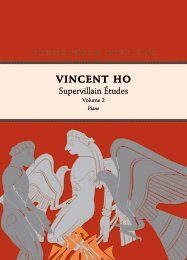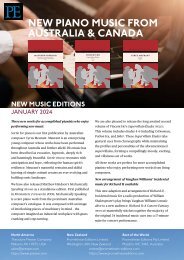Cloud Folk
by John Psathas | Percussion Octet and Piano
by John Psathas | Percussion Octet and Piano
You also want an ePaper? Increase the reach of your titles
YUMPU automatically turns print PDFs into web optimized ePapers that Google loves.
John Psathas (1966)<br />
John Psathas is one of New Zealand’s most frequently performed composers and has been<br />
described by fellow composer Christos Hatzis as one of the three most important living<br />
composers of the Greek Diaspora. Psathas’ output has spanned high-energy chamber and<br />
orchestral works, film scores and multi-disciplinary works, with strong focus on large-scale<br />
collaborative projects in recent years.<br />
Psathas grew up in Taumaranui and then Napier, and left high school early to study<br />
composition and piano at Victoria University of Wellington. He then undertook further<br />
studies with composer Jacqueline Fontyn in Belgium before returning to New Zealand.<br />
Early success came in 1991 with Matre’s Dance, a maximum-energy duet for percussion and<br />
piano that has since made Psathas’ name internationally known through having been taken<br />
up and championed by percussionist Dame Evelyn Glennie.<br />
International acclaim continued to accumulate for Psathas following the August 2000<br />
premiere of his saxophone concerto Omnifenix by legendary jazz saxophonist Michael<br />
Brecker. The growing popularity of his Drum Dances for drum kit and piano established<br />
Psathas as an exceptional writer for percussion. Psathas also came to embrace writing<br />
for large forces; evidenced by the much heralded View From Olympus, a double concerto<br />
for percussion, piano and orchestra. Since its premiere, View From Olympus has gone on<br />
to be performed by many orchestras around the world. His piano concerto Three Psalms<br />
followed in 2004. In 2008 Chamber Music New Zealand commissioned Psathas to write<br />
a string quartet, A Cool Wind, for the Takács Quartet. All the while, Psathas continued to<br />
write formidable and exciting works for percussion, evidenced by Djinn, a concerto for<br />
solo marimba and chamber orchestra, and One Study One Summary for marimba, junk<br />
percussion and digital audio, which has become a popular standard among the repertoire of<br />
modern works for solo percussion and reflects a period in which Psathas explored the world<br />
of electronica.<br />
PE190 – iii


















